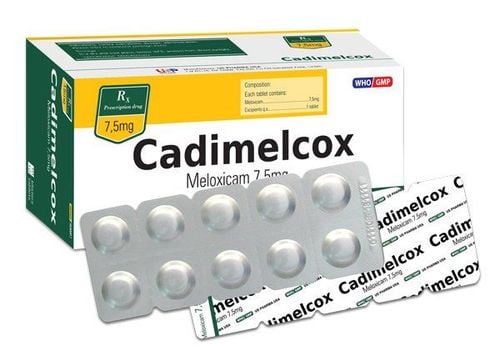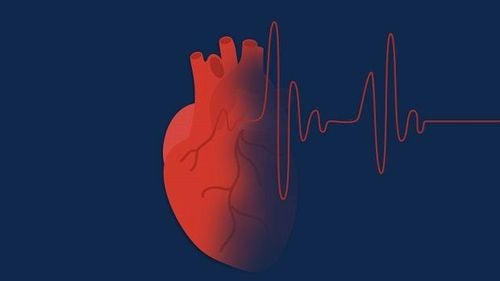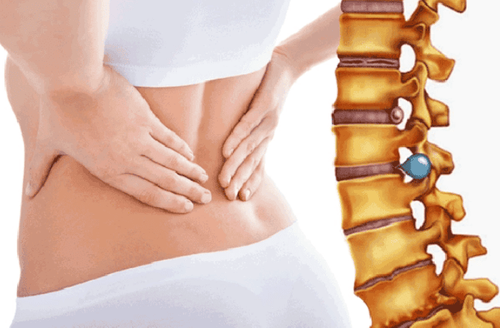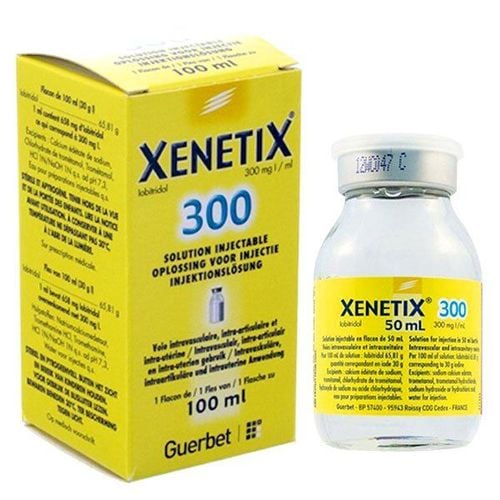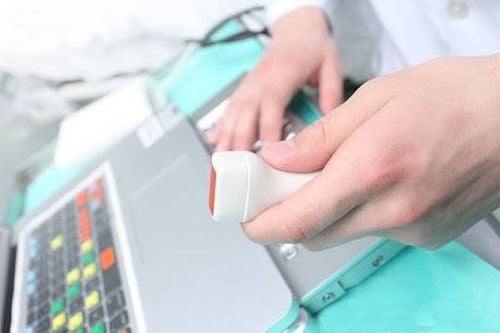This is an automatically translated article.
The article was professionally consulted by Specialist Doctor II Duong Minh Tan - Orthopedic Doctor - Department of General Surgery - Vinmec Phu Quoc International General Hospital.Lumbar disc herniation is a disease with a high incidence, causing many uncomfortable symptoms for patients such as pain, numbness, swelling in the back, even muscle atrophy, paralysis, ... Surgery for herniated disc is one of the treatment methods to effectively control this disease.
1. Overview of lumbar disc herniation
1.1 Concept Normally, the human spine plays the role of a pillar to support the body. Between the vertebrae are discs with good elasticity, which are responsible for absorbing impulses, thereby protecting the spine. With a shape similar to the letter S, the spine can disperse the impact forces on the body, reducing shocks to the legs in an upright position.
Herniated disc is a condition in which the outer fibrous capsule of the disc is torn or broken, creating gaps. The nucleus pulposus of the spinal disc therefore escaped from this gap at a rapid rate, forming a herniated mass, entering the spinal canal, compressing the spinal cord and nerve roots.
1.2 Causes and symptoms Some of the main causes of herniated discs include: Working in the wrong position, carrying heavy objects in the wrong way, trauma to the spine due to accidents, the spine is naturally degenerative due to age. effects (the disease is common in people 35-50 years old). In addition, there are a number of other factors that increase the risk of the disease, including being overweight, obese, having spondylolisthesis (spondylolisthesis, spondylolisthesis, kyphoscoliosis), job characteristics (people) often carrying heavy loads or people who are sedentary for 8-10 hours/day), habit of wearing high heels,...
Symptoms of the disease include: Severe, sudden or dull pain in the lower back. radiating lumbar region. Patients may experience low back pain accompanied by sciatica, pain spreading in an arc to the front of the chest, numbness or weakness of the extremities, pain that increases when sitting, coughing, sneezing or defecating,...

Người bệnh có thể bị đau lưng dữ dội đột ngột hoặc âm ỉ vùng thắt lưng
This is a dangerous disease, which can cause many consequences if treated late or with the wrong treatment method. Common consequences include: Difficulty moving the limbs, inability to work, damage to the sciatic nerve, bladder or bowel function disorders, urinary incontinence, paralysis, disability, atrophy of the leg muscles,...
1.3 Treatment Treatment is usually according to the stage of the disease (sooner or later), the nature of the damage, location, complications, the degree of influence on the ability to move and live, labor,... From there, the patient can be treated with conservative methods or surgical intervention.
With conservative treatment, patients are often prescribed pain relievers combined with anti-inflammatory drugs, anti-spasmodic drugs,... Besides, patients can be given epidural injections, injections. around the nerve root and other measures such as massage, physical therapy, infrared light, spinal stretching, lumbar belt,...
In some cases, nerve root blockade can be used. Selective for the relief of pinched nerve pain. When the pain symptoms are reduced, the patient will be rehabilitated to prevent future damage, which can be combined with oriental medicine methods such as acupressure, acupuncture,...
Surgery for herniated disc Lumbar spinal cushioning is also the indicated method in certain cases.
2. Learn surgical methods of disc herniation
2.1 When should lumbar disc herniation surgery be performed? The surgical method for herniated disc in the lumbar spine carries certain risks, so not all patients can perform it. Surgery should only be performed in the following cases:
Failure of medical treatment after 5 - 8 weeks; Herniated disc causes acute nerve compression; Disc herniation causes capsular tear, migratory hernia; The patient does not want medical treatment when the doctor has a low probability of response.
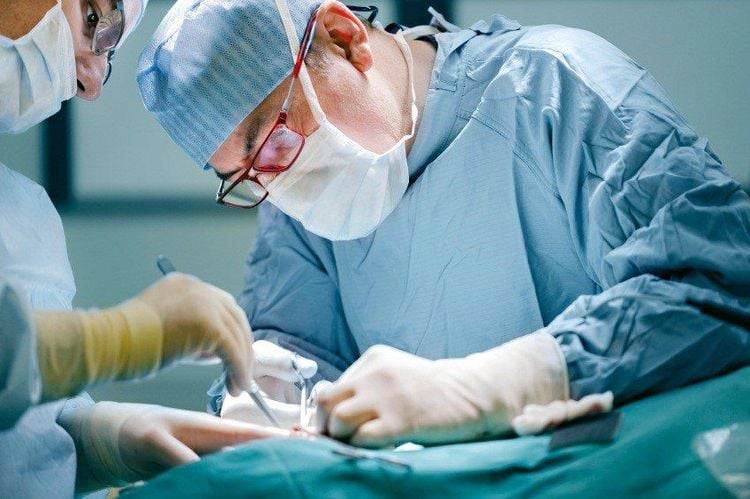
Người bệnh thực hiện phẫu thuật sau khi điều trị nội khoa thất bại
Some special cases need emergency surgery. They are:
Herniated disc causes excessive pain and the use of pain relievers does not work; Herniated disc causing paralysis or cauda equina syndrome: Compression of nerve roots reduces muscle tone, causes weakness or paralysis of muscle groups, leading to sudden flaccid paralysis of the lower extremities, accompanied by urinary and genital urination. 2.2 Surgical methods To perform surgery, patients need to be examined and treated early. Before surgery, the patient will be diagnosed with CT, MRI images and review previous treatment courses.
Commonly applied lumbar disc herniation surgical methods include:
Open surgery or through the balloon tube, removing the herniated nucleus, decompressing the nerve. During surgery, an aided microscope can be used; Endoscopic spine surgery, remove the herniated nucleus. Each of the above surgical methods has its own advantages and disadvantages. The choice of method will depend on the nature of the patient's injury.
2.3 Complications of lumbar disc herniation surgery Any surgical treatment carries risks, including surgery for herniated discs. In some cases, patients who have undergone surgery still cannot move flexibly, and the disease may even progress more severely. The following are some possible complications during and after surgery for lumbar disc herniation:
Infection: Using unsterilized surgical instruments or open incisions can expose the patient to high risk of infection. Infections involving the spinal canal or discs can be life-threatening; Herniated disc recurrence: After about 6 months of surgery, patients can reduce pain symptoms but cannot fully recover. This disease also has a rather high recurrence rate of 5 - 15%; Spondylolisthesis: After surgery, the flexibility of the spine may not be as it was before; Nerve damage: During surgery, some nerves can be severely damaged and affect other organs in the body; Other complications: Patients often experience numbness, fibrosis in the lumbar spine, bleeding in the tissues, paralysis or even death.
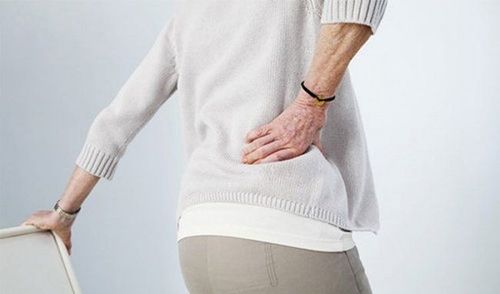
Phẫu thuật thoát vị đĩa đệm cột sống thắt lưng có thể tiềm ẩn nhiều nguy cơ rủi ro cho người bệnh
2.4 Notes after surgery Should follow meditation exercises, gentle yoga exercises to quickly reduce symptoms of back pain; Consult your doctor before performing physical therapy exercises; Building a reasonable nutritional regimen, supplementing with necessary nutrients for the body, especially foods rich in vitamins, iron, calcium,...; Drink enough 2 liters of water a day, should drink more fruit juice to strengthen resistance; Arrange reasonable working and resting time, sleep 8 hours/day, don't stay up too late; Do not carry heavy objects or work too hard; Keep a reasonable weight, avoid being overweight or obese; Stay positive and relaxed; Strictly follow all instructions and instructions of the doctor during treatment. Patients with lumbar disc herniation, if they have blood pressure, heart disease, diabetes, hemophilia, etc., need to consider carefully before deciding to perform surgery. It is best for the patient to see a doctor as soon as possible so that the right treatment can be given.
Surgery to remove lumbar disc herniation is one of the annual surgeries at Vinmec Central Park International General Hospital with a success rate of over 95%. Surgery to treat herniated discs at Vinmec Central Park is performed by a team of experienced doctors and surgical crews with modern machinery such as: Avance CS2 anesthesia machine; GE and C-arm's R860 ventilator.
Please dial HOTLINE for more information or register for an appointment HERE. Download MyVinmec app to make appointments faster and to manage your bookings easily.




